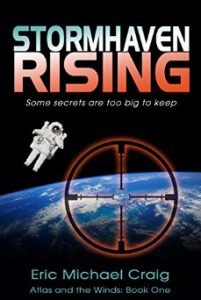
In the wake of the discovery of an asteroid on a collision course with Earth, the United States government scrambles to contain the news before it can spark a panic– but some secrets are too big to keep. Soon they aren’t the only ones rushing to devise countermeasures.
Their most viable competitors are the Chinese, and a global megacorporation to end all megacorporations: Stormhaven, founded and run by uber wealthy reclusive genius Colton Taylor. (Think Elon Musk, but considerably more altruistic and an all-around decent human being.)
Set in a near future where the US Department of Defense and NASA have only become more encumbered by bureaucratic gridlock (and in NASA’s case, insufficient funding,) private sector technologies have evolved leaps and bounds beyond that of the public sector. As such, Taylor’s Stormhaven may be the only real hope Earth has. There’s just one problem: private spaceflight is strictly forbidden, not just in the US, but on a global scale. In light of the strained political climate of impending doom, the last thing the US government wants to do is grant Stormhaven permission to reach space.
The tense and at times disastrous narrative that evolves from this situation is equal parts grim and inspiring. Stormhaven Rising represents an interesting blend of genres: part political thriller, part hard scifi, and part impending disaster. Together they make for a fun and fascinating read.
The story moves along at a brisk pace, never encumbered by long-winded technical descriptions or needless exposition. (The author has a knack for explaining complex technologies, like theoretical EM drives, in a concise manner.) The dialogue is smooth and natural, and although the narrative follows a large cast of characters, they were all so well developed that I never had trouble telling them apart. (I had too many favorites to list, and the supercomputer MICA gets an honorable mention as well.)
As plausible as the science and the politics are, there was one point that pushed the limits of credulity: the actions of Taylor himself. Eccentric billionaires are rarely such unequivocally good people, and global megacorporations are rarely so benevolent. The author seems to have recognized this, judging by a certain conversation:
“Are you saying that he wants to stop the asteroid?” Shapiro sat forward, considering the possibility for the first time.
“I don’t know, but with the technical prowess at his fingertips, is it beyond possibility?”
“I doubt it,” Marquez disagreed. “Rich men seldom have altruistic hearts.”
Well said, General Marquez, well said indeed.
Character motives aside, it’s a rare writer that can breathe new life into the “killer asteroid” premise and make it believable. Stormhaven Rising offers that and much more to potential readers: relatable characters, tension, brisk pacing, political machinations, advanced technology, and a sprinkling of gut-wrenching disasters. In all it’s a thoroughly enjoyable read, and I highly recommend it.
Stormhaven Rising is available in ebook and paperback from Amazon. The sequel, Prometheus and the Dragon, is out now (and on my to-read list.)
